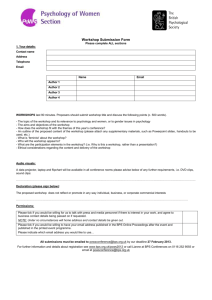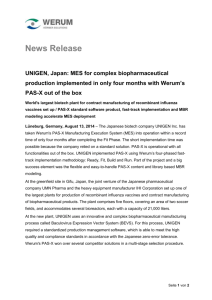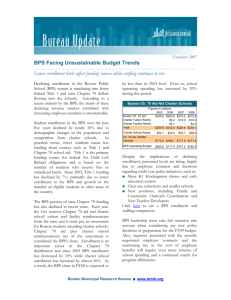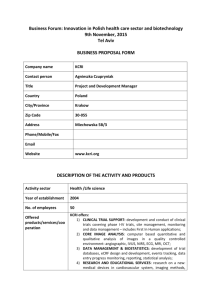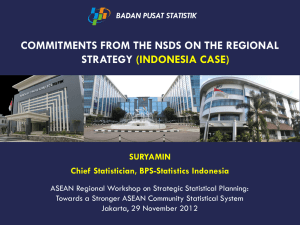PR-05.15 Revision to the M.S. and Ph.D. in Biopharmaceutical
advertisement
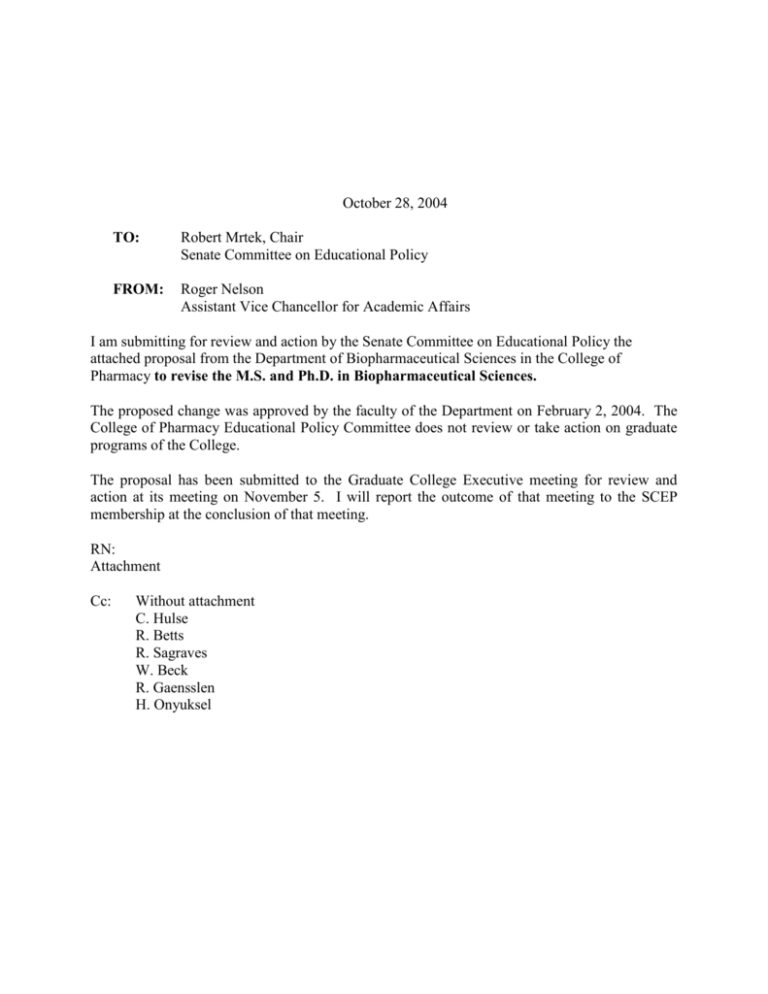
October 28, 2004 TO: Robert Mrtek, Chair Senate Committee on Educational Policy FROM: Roger Nelson Assistant Vice Chancellor for Academic Affairs I am submitting for review and action by the Senate Committee on Educational Policy the attached proposal from the Department of Biopharmaceutical Sciences in the College of Pharmacy to revise the M.S. and Ph.D. in Biopharmaceutical Sciences. The proposed change was approved by the faculty of the Department on February 2, 2004. The College of Pharmacy Educational Policy Committee does not review or take action on graduate programs of the College. The proposal has been submitted to the Graduate College Executive meeting for review and action at its meeting on November 5. I will report the outcome of that meeting to the SCEP membership at the conclusion of that meeting. RN: Attachment Cc: Without attachment C. Hulse R. Betts R. Sagraves W. Beck R. Gaensslen H. Onyuksel Title: Revision of the M.S. and Ph.D. in Biopharmaceutical Sciences Sponsor: Department of Biopharmaceutical Sciences, College of Pharmacy Description: The Department of Biopharmaceutical Sciences proposes the following changes to the M.S. and Ph.D. in Biopharmaceutical Sciences: 1. Eliminate the four concentrations in the Ph.D. program (variable hours of 9—14) 2. Replace the Ph.D. concentrations with Program Electives (10 credit hours) 3. Drop the 5-hour concentration requirement from the M.S. program 4. Replace the M.S. concentration requirement with Program Electives (5 hours) 5. The range of 17—22 hours of electives for the Ph.D. changes to a specific 21 hours 6. Drop BPS 503 as a core requirement in the M.S. and Ph.D. programs 7. Add GCLS 504 and 505, Research Methods I and II (total 3 hours) as BPS core requirements in the M.S. and Ph.D. programs 8. Total hours for the M.S. and Ph.D. remain unchanged at 32 and 96 (beyond the baccalaureate), respectively Justification Changes #1-#5 The original Ph.D. in Biopharmaceutical Sciences, implemented in Fall 2002, had four concentrations corresponding to faculty research emphases in the department at the time. Each concentration had stated course requirements in addition to the Ph.D. program core course requirements. It has become clear after two-plus years experience with the program that the concentrations should be eliminated. A Ph.D. program with minimal core course requirements and a flexible menu of electives will serve the needs of the students better than the formal concentrations. The requirements of the Ph.D. in Biopharmaceutical Sciences, as approved, are presented in Table 1. Each student is required to complete 96 hours from the B.S. and 64 hours from the M. S. level. At least 20 hours of didactic coursework must be at the 500-level. The Ph.D. program core consists of 25 hours. Under the current program, all students must declare a concentration upon choosing an advisor. Each of the concentrations has course requirements, ranging from 9-14 hours. Elective course hours make up the remaining didactic course requirements (17-22 hours) along with Research (40 hours). Credit hour requirements are summarized in Table 2. 1 One of the reasons that the Department changed its name to Biopharmaceutical Sciences and put together its own Ph.D. program was to integrate several disciplines of the biopharmaceutical sciences, since the lines of these disciplines have blurred and overlapped over many years. It is the intent of this proposal to embrace this concept, to continue the evolution of this field, and create a unified Ph.D. with no formal concentrations. Under the proposed structure, each student will be able to tailor the program to his or her future goals, and get appropriate didactic preparation in the area selected for research, through the choice of elective courses that will be made in collaboration with the research advisor. To accomplish this goal, the Ph.D. Program core requirements (25 credit hours) will remain as originally proposed and approved. The concentration requirements are deleted and replaced by a list of “Biopharmaceutical Sciences Ph.D. Program Electives.” The list contains courses that are now regularly offered, and from which students and advisors can choose a group that meets the needs of the student and of the laboratory in which the student has chosen to work. Each student will complete 10 credit hours from the list that will be maintained by the Department of Biopharmaceutical Sciences Graduate Program in the form of a Handbook; the current list is comprised of the approved “Concentration Core Courses.” Any courses taken from the list of “Biopharmaceutical Sciences Ph.D. Program Electives” beyond the required 10 hours will apply to the 21 hours of “Elective” courses. The core courses and program electives are summarized in Table 3. The distribution of credit hours for the proposed program is shown in Table 4. These changes will encourage students to see the interdisciplinary nature of the discipline of Biopharmaceutical Sciences. The Biopharmaceutical Sciences faculty requests that these changes in requirements be applicable to students who entered in Fall, 2002, or later. This element will enable us to move students ahead whose progress has been delayed by stated concentration requirements they have been unable to fulfill. Since BChe 460 was offered after the Fall of 2002, either BChe 460 or GCLS 501 credit (3 hours) will be accepted as “Biopharmaceutical Sciences Ph.D. Program Electives” credit; any additional hours will be applied to “Elective” credits. The research interests of many of the Biopharmaceutical Sciences faculty fit into more than one of the formal concentrations, and the subdivisions in the Ph.D. program do not appropriately reflect the interdisciplinary nature of activities within academics, government, and industry in those areas represented by the program. 2 Several changes in other academic programs at the university were also instituted – almost simultaneously with the original construction of the Ph.D. in Biopharmaceutical Sciences -- that have precluded students from meeting the requirements for the degree in a timely manner. Proceeding along the present path without the proposed revisions will continue to create problems for students. These changes could not have been anticipated at the time of original program approval. Changes #6 and #7 Changes #6 and #7 are the result of changes made in the Graduate Education in Medical Sciences (GEMS) program. Several classes have been added in the GEMS program that directly overlap with approved courses in the BPS program; the BPS program proposes to utilize these courses instead of offering a second equivalent course. With regard to this program revision, BPS 503 (Laboratory Techniques in Biopharmaceutical Sciences) is equivalent in content to GCLS 504 and 505 (Research Methods I & II). Thus, BPS 503 is dropped and replaced by GCLS 504 and 505. 3 Table 1. Originally approved requirements for the Ph.D. in Biopharmaceutical Sciences. Dept. Course Name BPS Program Core BPS BPS 501 Biopharmaceutical Sciences I 502 Biopharmaceutical Sciences II Laboratory Techniques in Biopharmaceutical BPS 503 Sciences Seminar in Biopharmaceutical Sciences (1 BPS 595 cr/sem) BSTT 400 Biostatistics I Scientific Integrity And Responsible GC 401 Research GC 470 Essentials For Animal Research GC 471 Experimental Animal Techniques Pharmaceutics (PC) Concentration Requirements BPS 510 Principles of Interfacial Phenomena Dissolution and Bioavailability of Dosage BPS 515 Forms BChe 460 Biochemistry Pharmacodynamics (PD) Concentration Requirements BPS 551 Pharmacological Basis of Therapeutics I BPS 552 Pharmacological Basis of Therapeutics II BChe 460 Biochemistry Pharmacogenomics (PG) Concentration Requirements BPS 551 Pharmacological Basis of Therapeutics I BPS 552 Pharmacological Basis of Therapeutics II BPS 555 Pharmacogenomics BChe 460 Biochemistry Gene 502 Somatic Cell and Human Genetics Pharmacokinetics (PK) Concentration Requirements BPS 545 Advanced Pharmacokinetics BPS 546 Computer Techniques in Pharmacokinetics BPS 551 Pharmacological Basis of Therapeutics I BPS 552 Pharmacological Basis of Therapeutics II PCOL 508 Drug Metabolism and Disposition 4 Cr. 4 4 3 8 3 0 1 2 3 2 5 2 2 5 2 2 1 5 4 3 3 2 2 2 Table 2. Original credit hour requirements of the Ph.D. in Biopharmaceutical Sciences. Concentra tion PC PD PG PK BPS Core 25 25 25 25 Concentrati on Core Electi ve Resea rch Total 10 9 12 14 21 22 19 17 40 40 40 40 96 96 96 96 Table 3. Proposed requirements of the Ph.D. in Biopharmaceutical Sciences. Dept. Course Name BPS Program Core BPS 501 Biopharmaceutical Sciences I BPS 502 Biopharmaceutical Sciences II BPS 595 Seminar in Biopharmaceutical Sciences (1 cr/sem) BSTT 400 Biostatistics I GC 401 Scientific Integrity And Responsible Research GC 470 Essentials For Animal Research GC 471 Experimental Animal Techniques GCLS 504/505 Research Methods I & II BPS Ph.D. Program Electives (Not Formally listed in Catalog) BPS 510 Principles of Interfacial Phenomena BPS 515 Dissolution and Bioavailability of Dosage Forms MDCH 564 Physical Medicinal Chemistry BPS 545 Advanced Pharmacokinetics BPS 546 Computer Techniques in Pharmacokinetics BPS 555 Pharmacogenomics GCLS 501 Biochemistry † GCLS 511 Molecular Genetics PCOL 425 Medical Pharmacology PCOL 508 Drug Metabolism and Disposition †BChe 460 will be accepted for students who completed this class prior to the initiation of the GCLS program. 5 Cr. 4 4 8 3 0 1 2 3 3 2 3 3 3 2 3 3 6 2 Table 4. Proposed credit hour requirements of the Ph.D. Program in Biopharmaceutical Sciences. Progr BPS Elec Resea Tot am Core tive rch al Electives 25 10 21 40 96 Catalog Statement: See Appendix Minority Impact: None Budgetary and Staff Implications: The proposed revisions carry no budgetary or staff implications. Library Support Implications: None Proposed Effective Date: Fall 2005, but the changes in concentration structure and requirements may apply to any student who entered the Ph.D. program in Fall 2002 or later. 6 Current Proposed Biopharmaceutical Science Mailing Address: College of Pharmacy (MC 865), 833 South Wood Street, Chicago, Illinois 60612-7231 Campus Location. 335 Pharm Curriculum Code: 20FS1903PHD Telephone: (312) 996-0888 E-mail: hayat@uic.edu Director of Graduate Studies: Hayat Onyuksel The Department of Biopharmaceutical Sciences offers work leading to degrees in biopharmaceutical sciences at both the master's and doctoral levels. Students are not admitted to the M.S. program in this department. Coursework and research are available in the concentration areas of pharmaceutics, pharmacodynamics and toxicology, pharmacokinetics, and cellular and molecular biology and pharmacogenomics. Admission Requirements Transcripts of all undergraduate and any graduate work must be submitted. In addition to the Graduate College minimum requirements, applicants must meet the following program requirements: Prior degrees: Baccalaureate degree in pharmacy, pharmaceutical sciences, chemistry, biochemistry, biological sciences, a related medical science area, or a doctor of pharmacy degree. Grade point average: At least 4.00 (A=5.00) in work for the first academic degree Tests Required: GRE general Minimum TOEFL Score: 600 (paper-based); 250 (computer-based) Letters of Recommendation: Three required from individuals who are familiar with the applicant's training, ability, character, and potential for successful completion of the program. Personal Statement: Required; one page; the statement should address the applicant's educational and professional objectives. This program does not admit students for a M.S. degree. The M.S. is awarded to students who meet the stated requirements, but who do not complete all the requirements for a Ph.D. Biopharmaceutical Science Mailing Address: College of Pharmacy (MC 865), 833 South Wood Street, Chicago, Illinois 60612-7231 Campus Location. 335 Pharm Curriculum Code: 20FS1903PHD Telephone: (312) 996-0888 E-mail: hayat@uic.edu Director of Graduate Studies: Hayat Onyuksel The Department of Biopharmaceutical Sciences offers work leading to degrees in biopharmaceutical sciences at both the master's and doctoral levels. Students are not admitted to the M.S. program in this department. Degree Requirements In addition to the Graduate College minimum requirements, students must meet the following program requirements: Master of Science Minimum Semester Hours Required: 32 Coursework Required Core Courses: BPS 501, 502, 503, Bstt 400, GC 401, 470 and 471 plus BPS 595 (seminar) every semester for 4 credit hours Degree Requirements In addition to the Graduate College minimum requirements, students must meet the following program requirements: Master of Science Minimum Semester Hours Required: 32 Coursework Required Core Courses: BPS 501, 502, Bstt 400, GC 401, 470, 471, GCLS 504, 505, plus BPS 595 (seminar) every semester for 4 credit Admission Requirements Transcripts of all undergraduate and any graduate work must be submitted. In addition to the Graduate College minimum requirements, applicants must meet the following program requirements: Prior degrees: Baccalaureate degree in pharmacy, pharmaceutical sciences, chemistry, biochemistry, bioengineering, biological sciences, a related medical science area, or a doctor of pharmacy degree. Grade point average: At least 3.00 (A=4.00) in work for the first academic degree Tests Required: GRE general Minimum TOEFL Score: 600 (paper-based); 250 (computer-based) Letters of Recommendation: Three required from individuals who are familiar with the applicant's training, ability, character, and potential for successful completion of the program. Personal Statement: Required; one page; the statement should address the applicant's educational and professional objectives. This program does not admit students for a M.S. degree. The M.S. is awarded to students who meet the stated requirements, but who do not complete all the requirements for a Ph.D. 7 total, and a minimum of 5 credit hours in concentration electives or electives Thesis, Project, or Coursework-only options Thesis required. No other options available. Thesis: students must earn at least 6 hours in BPS 598. Doctor of Philosophy Minimum Semester Hours Required: 96 from the baccalaureate, 64 from the master’s. Coursework At least 20 hours must be in 500-level didactic courses. Required Core Courses: BPS 501, 502, 503, Bstt 400, GC 401, 470, 471 plus BPS 595 (seminar) every semester for 8 credit hours total. Concentration Requirements: Pharmaceutics: BPS 510, 515 and BChe 460 Pharmacokinetics: BPS 545, 546, 551, 552 and Pcol 508. Pharmacodynamics / Toxicology: BPS 551, 552, and BChe 460. Pharmacogenomics Cell and Molecular Biology: BPS 551, 552, 555, BChe 460, Gene 502. Thesis: students must earn at least 40 hours in BPS 599. Examinations Departmental Qualifying Examination: May be required for certain admitted students to be used as a basis for advisement on additional coursework to insure an appropriate level of preparedness. Preliminary (Candidacy) Examination: Required. Dissertation Required. hours total. Thesis, Project, or Coursework-only options Thesis required. No other options available. Thesis: students must earn at least 6 hours in BPS 598. Doctor of Philosophy Minimum Semester Hours Required: 96 from the baccalaureate, 64 from the master’s. Coursework At least 20 hours must be in 500-level didactic courses. Required Core Courses: BPS 501, 502, Bstt 400, GC 401, 470, 471, GCLS 504, 505 (3 credit hours) plus BPS 595 (seminar) every semester for 8 credit hours total, and a minimum of 10 credit hours of program elective courses from a current list maintained by the department. DELETE Thesis: students must earn at least 40 hours in BPS 599. Examinations Departmental Qualifying Examination: May be required for certain admitted students to be used as a basis for advisement on additional coursework to insure an appropriate level of preparedness. Preliminary (Candidacy) Examination: Required. Dissertation Required. 8 Courses Added as Requirements GCLS 504 Research Methods I 1 TO 2 hours. Lectures, demonstrations, and discussions concerned with principles and practical aspects of modern quantitative biochemical, molecular biological, physiological and biophysical methodology such as separation techniques and studies of biomembranes. May be repeated. Students may register for more than one section per term. Restricted to students enrolled in a graduate program offered through the Colleges of Medicine or Pharmacy or the departments of Bioengineering or Biological Sciences or consent of the instructor. GCLS 505 Research Methods II 1 TO 3 hours. Lectures, demonstrations, and discussions concerned with principles and practical aspects of modern quantitative biochemical, molecular biological, physiological and biophysical methodology such as bioimaging and biochemical analysis. May be repeated. Students may register for more than one section per term. Restricted to students enrolled in a graduate program offered through the Colleges of Medicine or Pharmacy or the departments of Bioengineering or Biological Sciences or consent of the instructor. 9
